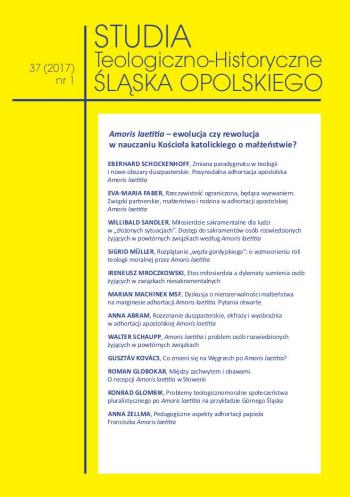Die Entflechtung des Gordischen Knotens: Zur Stärkung der Moraltheologie durch Amoris laetitia
Disentanglement of “a Gordian knot”: on the reinforcement of the rule of moral theology by Amoris laetitia.
Author(s): Sigrid MüllerSubject(s): Ethics / Practical Philosophy, Family and social welfare, Pastoral Theology, Canon Law / Church Law
Published by: Uniwersytet Opolski
Keywords: Synods of Bishops on marriage and family (2014, 2015); Amoris laetitia; moral theology; divorced people living in second partnerships; relation between the theological disciplines;
Summary/Abstract: The relations between moral theology, dogmatics, canon law and pastoral theology concerning the question of divorced people living in second partnerships were discussed during the bishop’s synods on marriage and family in 2014 and 2015 and compared to being akin to “a Gordian knot”. It appeared after argumentation and the application of logic that untying of it is not possible and that the only way of cutting free is with a sword. The present article shows how Pope Francis has started to untie the Gordian knot of the theological disciplines but not with a sword but rather through the undoing of particular threads. His tactful way of making interventions and giving orientation in the canon law and tips about the need for growth and reflection in the field of some elements of dogmatic teaching are the first steps in this process. Francis reaches forward with this due to the works already conducted by his predecessors and continues it in the sense of the Second Vatican Council. This way can be successfully express coherent depictions of moral theology and without contradictions between this discipline and the other theological disciplines. In the post-synodal exhortation Amoris laetitia Pope Francis demands clearly that moral theology follows the line which was developed after the Second Vatican Council. The apostolic exhortation cannot be interpreted as a confirmation of the line of German moral theology after the Second Vatican Council. The differences appear first of all in the anthropology and in the intention that moral theology should be more strongly focused on life’s practice and in this way be more closely connected to the service of pastoral work.
Journal: Studia Teologiczno-Historyczne Śląska Opolskiego
- Issue Year: 37/2017
- Issue No: 1
- Page Range: 79-103
- Page Count: 25
- Language: German

